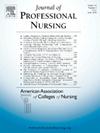An end-of-life nursing education consortium (ELNEC) regional approach to integrating primary palliative care in nursing education
IF 2.9
3区 医学
Q1 NURSING
引用次数: 0
Abstract
With the concurrent movement toward competency-based nursing education and the incorporation of Hospice, Palliative, and Supportive Care as one of the four spheres of care in the latest AACN Essentials, nurse educators face a myriad of challenges in incorporating palliative care content into undergraduate and graduate curricula. The challenges include: a lack of faculty expertise in palliative care education; a lack of administrative or faculty support to include primary palliative care content in nursing curricula; a lack of evidence-based teaching strategies on primary palliative care nursing education; and, a lack of funding to support the development of robust, evidence-based strategies to strengthen primary palliative care nursing education. The purpose of this article is to describe an innovative regional approach advancing primary palliative care nursing education. A network of palliative care educators was established to support faculty in developing palliative care content in their curricula. To ensure nursing students are practice-ready, both undergraduate and graduate programs must provide education that builds knowledge and competency in primary palliative nursing care. Sustained funding is essential to enhance faculty expertise and further develop effective teaching innovations within this field.
临终护理教育联盟(ELNEC)将初级姑息治疗纳入护理教育的区域方法
随着以能力为基础的护理教育的同步发展,以及将临终关怀、姑息治疗和支持性护理作为最新AACN要点中四个护理领域之一,护士教育者在将姑息治疗内容纳入本科和研究生课程方面面临着无数的挑战。面临的挑战包括:缺乏姑息治疗教育方面的专业知识;缺乏行政或教师支持将初级姑息治疗内容纳入护理课程;初级姑息治疗护理教育缺乏循证教学策略此外,缺乏资金支持制定强有力的、以证据为基础的战略,以加强初级姑息治疗护理教育。这篇文章的目的是描述一个创新的区域方法推进初级姑息治疗护理教育。建立了一个姑息治疗教育者网络,以支持教师在他们的课程中发展姑息治疗内容。为了确保护理学生为实践做好准备,本科和研究生课程都必须提供初级姑息护理知识和能力的教育。持续的资助对于提高教师的专业知识和进一步发展该领域有效的教学创新至关重要。
本文章由计算机程序翻译,如有差异,请以英文原文为准。
求助全文
约1分钟内获得全文
求助全文
来源期刊
CiteScore
4.80
自引率
8.00%
发文量
153
审稿时长
52 days
期刊介绍:
The Journal will accept articles that focus on baccalaureate and higher degree nursing education, educational research, policy related to education, and education and practice partnerships. Reports of original work, research, reviews, insightful descriptions, and policy papers focusing on baccalaureate and graduate nursing education will be published.

 求助内容:
求助内容: 应助结果提醒方式:
应助结果提醒方式:


